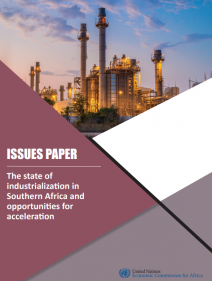Industrialization is arguably the most certain route to rapid, sustained, and sustainable economic development, for economies with large populations. No country has lifted millions of people out of poverty without industrializing. Successful industrialization is the missing link for the structural transformation and sustained economic growth that countries in Southern Africa so greatly desire. The contribution of manufacturing value added to gross domestic product (GDP) in the subregion of Southern Africa is very low. The average ratio of manufacturing value added to GDP in the subregion in 2018 was 11.8 per cent, with country ratios ranging from 4.8 per cent in Angola to 32 per cent in Eswatini. Highskill, technology-intensive manufactured goods constitute less than 30 per cent of exports from the subregion, with most economies still highly undiversified and dependent on a few primary commodities for revenue. Immense opportunities exist for industrialization in Southern Africa through value addition to commodities, beneficiation, and subregional integration. For Southern Africa to industrialize successfully, it is critical for the subregion to upgrade its productive capacity, promote investment in modern industries, develop and strengthen value chains, and deepen opportunities for subregional integration and trade. For this industrialization to be successful, inclusive, and sustainable, the necessary conditions will need to be created for the numerous industrial policies and strategies to take off. These include addressing the infrastructure deficit and infrastructure bottlenecks; adopting sound macroeconomic policies including on taxation and expenditure, governance, education, competition, trade, and investment; promoting technological learning and capabilities; and utilizing surpluses from traditional revenue streams to build an export oriented manufacturing sector.
Share this:
Release Date:
16 November, 2023
© United Nations Economic Commission for Africa

